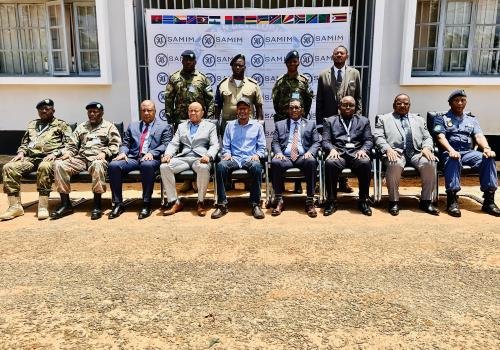
The involvement of the Southern African Development Community (SADC) in ending years of insurrection in Mozambique’s northern Cabo Delgado province by way of a multinational mission ends in July.
SAMIM – the SADC Mission in Mozambique – first deployed in July 2021 as a regional response to support Mozambique in combating terrorism and acts of violent extremism. This was as per a decision taken at an extraordinary SADC Summit of Heads of State and Government in Maputo. August last year saw the mission’s lifespan extended to 15 July this year. Going further, that SADC Organ Troika Summit directed SAMIM leadership to start a phased drawdown in mid-December last year followed by complete withdrawal by 15 July this year.
SADC Executive Secretary Elias Magosi, fresh off a visit to Democratic Republic of Congo (DRC) where he oversaw progress in establishing the regional bloc mission – SAMIDRC (SADC Mission in DRC), is now in Mozambique. His visit is said by a SADC statement to “oversee and appreciate the process of drawdown and exit plan from the province [Cabo Delgado]”.
The regional bloc mission in the East African country is staffed by troops, equipment and officers from Angola, Botswana, Democratic Republic of Congo (DRC), Lesotho, Malawi, South Africa, Tanzania and Zambia, with Rwanda providing a thousand-strong force, reportedly at the request of Mozambican President Felipe Nyusi.
While in Mozambique, Magosi was briefed on what the SADC statement termed “challenges and lessons learnt” with a view on recommendations for future SADC missions.
The impending drawdown comes amid a drop in violence in norther Mozambique where that country’s insurgency is concentrated. According to the Africa Center for Strategic Studies (ACSS), militant Islamist violence in northern Mozambique saw a 71% drop over the past year, with 127 violent events and 260 fatalities reported in 2023.
This change can be attributed to last year’s offensive by the Southern African Development Community and Rwandan forces who were deployed in July 2021 to help the Mozambican military dislodge the extremists from the cities of Palma and Mocimboa da Praia, the ACSS reported.
“The forces were able to regain control of 90% of the insurgents’ territory and drive the surviving militants into rural areas in the northeastern part of Macomia District, where they now operate in small groups without bases, conducting random attacks on civilians.
“The past year has been marked by an 80% drop in violence against civilians. This is particularly noteworthy since militant Islamist violence in northern Mozambique had always been distinguished by the extraordinarily high levels of violence against civilians, in some years exceeding 50% of all fatalities. In 2023, violence against civilians represented 23% of all fatalities. This comprised 53 attacks on civilians and 61 related fatalities (compared to 286 and 438, respectively, in 2022),” the ACSS said in a new report released this month.
The question for the coming year will be whether this progress can be sustained given the resiliency of the militants in this region, the ACSS asked, and said attention is also needed to address the underlying grievances in the Cabo Delgado region that have been drivers of the instability. Moreover, there are still 850 000 internally displaced people who have yet to return to their homes.









